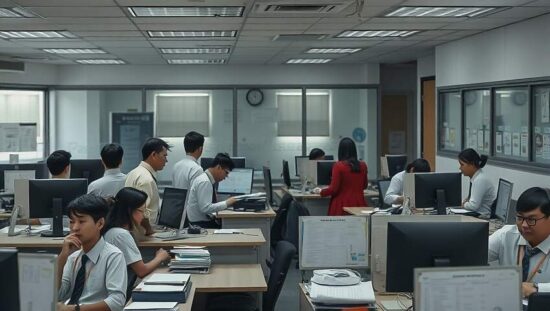The German Confederation of Trade Unions (DGB) is issuing a stark warning to employers, urging proactive measures to address a concerning rise in sick leave across the workforce. Speaking to Funke-Mediengruppe newspapers, DGB board member Anja Piel highlighted the particularly alarming prevalence of mental health issues and musculoskeletal conditions, such as back pain, driving the increase. She emphasized the obligation for employers to implement robust preventative measures, reduce workplace stress where possible and bolster protective health provisions for employees.
A critical point of contention raised by the DGB focuses on the detrimental practice of employees working while sick. Recent DGB surveys indicate that a staggering 63% of employees felt compelled to continue working despite being officially unwell. Piel cautioned against a culture of suspicion towards employees reporting illness, arguing that the financial consequences of this ‘presenteeism’ are demonstrably severe, estimated to be roughly double the cost of actual sick leave – a figure that accounts for potential contagion, increased accident risk and reduced overall productivity.
The recent spike in reported sick leave, particularly noticeable this autumn, has prompted varied explanations. While the introduction of electronic sick notes, providing a comprehensive record of illness reports, has undeniably contributed to greater transparency, the political discourse surrounding the issue has become heated.
Gitta Connemann, Chairwoman of the Association of Medium-Sized Businesses and Economy (MIT), has offered a contrasting perspective, pointing to the ease of obtaining sick leave through telephone consultations. “The barriers to reporting illness are simply too low” she stated in an interview with Funke-Zeitungen. While acknowledging the utility of telephone consultations during the pandemic, Connemann advocated for a return to more rigorous evaluation processes, suggesting the potential of modern video consultations for more accurate diagnoses. Her call for a “correction” to the current system reflects a growing debate around the potential for abuse and a desire to restore confidence in the integrity of sick leave reporting.
The divergence in viewpoints illuminates a deeper political tension – the balance between employee wellbeing and employer concerns regarding productivity and cost. While the DGB champions proactive health initiatives and dismisses suspicion towards unwell employees, the MIT’s stance centers on reinstating stricter protocols and potentially reducing access to easily attainable sick leave, painting a complex picture of the challenges facing Germany’s labor market. The ongoing debate risks further polarizing the relationship between labor and management, necessitating a constructive dialogue to address both the immediate crisis and the underlying causes of rising sick leave.





